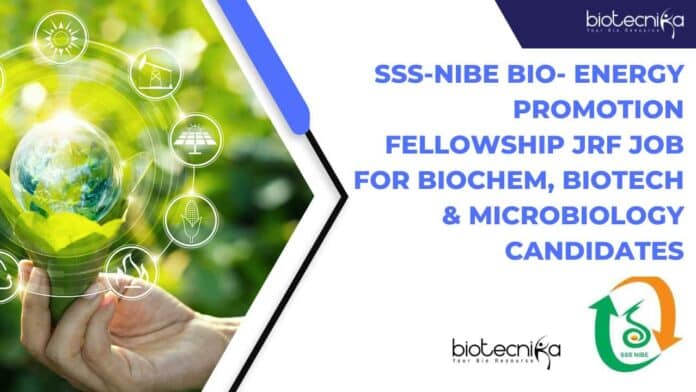SSS-NIBE Bio- Energy Promotion Fellowship JRF Job For Biochem, Biotech & Microbiology Candidates
SSS-NIBE Bio- Energy Promotion Fellowship JRF Job For Biochem, Biotech & Microbiology Candidates. BTech Biochem Engg, MSc Biotech, Biochem and Microbiology JRF Job. Interested and eligible applicants can check out all of the details on the same below
Rolling Advertisement for recruitment of JRF and Post-Doctoral fellowship (PDF) at SSS-NIBE
Applications are invited from eligible candidates for various research fellowships of Junior Research Fellow (JRF) and postdoctoral fellowship (PDF) in the field of Bioenergy under the “SSS-NIBE Bio- Energy Promotion fellowship” at SSS-NIBE, Kapurthala. The research positions for JRF/PDF are purely contractual positions. Particulars of academic qualifications, research experience and other requirements of the
contractual posts are given on the website of http://nibe.res.in/
Name of the Post: Junior Research Fellow (JRF)
No. of Posts: 01
Age Limit: The upper age limit for JRF shall be 28 years as on 31/08/2023 and 31/12/2023 for First Round and Second Round scrutiny respectively, which is relaxed up to 5 years in the case of candidates belonging to Schedule Castes/Schedule Tribes, Physically Handicapped and OBC(NCL) applicants as per Govt. of India rules & regulations.
Tenure: JRF will be tenable initially for
a period of two years. The term is extendable for one more year on thebasis of assessment of the progress made through publication and if not awarded the SRF. The combined tenure of JRF & SRF will not exceed more than five years in any case. On completion of two years as JRF and if the fellow is registered for PhD, the fellowship will be upgraded to SRF and stipend will be increased for the 3rd and subsequent years on the basis of assessment through interview by a review committee consisting of scientists concerned, Head of Division and Expert member in the relevant field. Extension of tenure will be purely on the basis of progress report and recommendation of the review committee.How to Apply:
Eligible candidates can download the Advertisement, Application Form and Instructions from website https://nibe.res.in. The candidates should fill the downloaded Application Form as per the instructions. Those appearing in the final year of Master’s examination from any of the above mentioned agencies, may also be considered for post of JRF and candidates who have submitted their thesis and waiting for viva may also apply for PDF. However, if selected, they will be required to provide proof of degree completion (provisional/original) before joining
Interested candidates should send their duly filled Application form (as per the Instructions) via Speed/Registered Post or e-mail to [email protected] with the subject “Application for JRF” for candidates applying for JRF and “Application for Post-Doctoral Fellowship (PDF)” for the candidates applying for PDF, along with the self-attested scanned copy of documents in single PDF file.
Qualification/ eligibility: Candidates must either have 60% marks or equivalent CGPA in B.E./B.Tech. (Degree in Chem. Engg., Mech. Engg., Agri. Engg., Civil Engg., Biochem. Engg., Energy Engg., Environmental and allied engineering subjects or must have 60% marks in M.Sc. (Chemistry, Biochemistry, Biotechnology, microbiology and allied science subjects) and GATE/NET qualification as applicable.
Fellowship Amount (Prerevised): Rs.31000 per month +HRA as admissible or Hostel facility if available.
Download the application format below
Check the notification below
Here are five possible interview questions that could be asked in the technical round for the Junior Research Fellow (JRF) position, along with their answers:
Question 1: Can you briefly explain the focus of your previous research experience, and how it aligns with the field of Bioenergy? Answer: Certainly. In my previous research, I’ve been investigating the optimization of microbial processes for biofuel production. I’ve worked on enhancing the yield of bioenergy resources using sustainable methods. This experience has provided me with a solid foundation in bioenergy research, which I believe aligns well with the objectives of the JRF position.
Question 2: The advertisement mentions a requirement for GATE/NET qualification. Could you elaborate on your GATE/NET score and how it reflects your proficiency in the subject? Answer: Of course. I successfully cleared the GATE examination with a score of [Your GATE Score]. This achievement demonstrates my in-depth understanding of the subject matter and my ability to tackle complex problems. It also showcases my commitment to continuous learning and staying updated with the latest developments in the field.
Question 3: The JRF tenure is initially for two years, extendable based on progress. Can you share an example of a research project you worked on that had a significant impact or yielded notable results within a limited timeframe? Answer: Certainly. During my Master’s program, I was involved in a project focused on optimizing enzymatic reactions for more efficient biofuel production. Within a span of 18 months, we were able to significantly increase the conversion rate, resulting in a 30% improvement in biofuel yield. This experience highlights my ability to contribute meaningfully to research within a defined timeframe.
Question 4: The fellowship requires candidates to have 60% marks or equivalent CGPA. Can you discuss a challenging academic project or coursework you undertook that demonstrates your problem-solving skills and technical acumen? Answer: Absolutely. One of the most challenging projects I undertook was the design and construction of a miniature bioreactor for the cultivation of algae. This project involved integrating engineering principles, biochemistry, and microbiology to create an efficient system. Overcoming technical obstacles and achieving successful cultivation showcased my ability to apply interdisciplinary knowledge to practical solutions.
Question 5: The fellowship aims to promote research in Bioenergy. Can you share your perspective on the role of Bioenergy in addressing current environmental and energy challenges? Answer: Certainly. Bioenergy plays a crucial role in transitioning to a more sustainable energy landscape. It offers the potential to reduce greenhouse gas emissions, diversify energy sources, and contribute to energy security. By harnessing organic materials for fuel production, we can mitigate the environmental impact of fossil fuels and promote a cleaner and greener future.
Please note that these answers are just examples and can be tailored based on your actual experiences and achievements.
Editor’s Note: SSS-NIBE Bio- Energy Promotion Fellowship JRF Job For Biochem, Biotech & Microbiology Candidates. Please ensure you are subscribed to the Biotecnika Times Newsletter and our YouTube channel to be notified of the latest industry news. Follow us on social media like Twitter, Telegram, Facebook





































